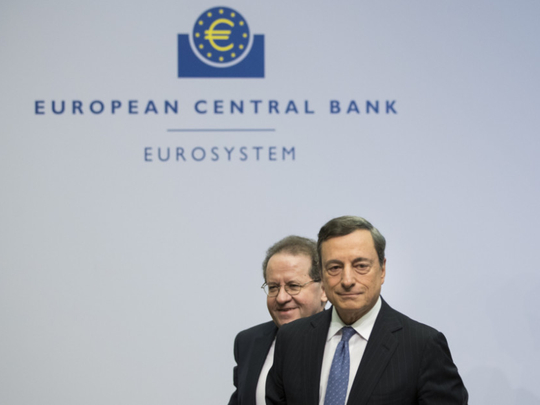
FRANKFURT: The European Central Bank kept its interest rates and policy plans unchanged on Thursday and said the immediate stress caused to markets by Britain’s shock vote to leave the European Union had been contained.
ECB President Mario Draghi said it was too early to ascertain the full impact of Brexit, however, and underlined that the Eurozone’s central bank was prepared to take more actions to lift inflation and economic growth if necessary.
“The risks to the Eurozone economy remain tilted to the downside,” he told a news conference after the ECB left rates and other measures unchanged.
It kept its deposit rate at minus 0.4 per cent and the main refinancing rate at 0.00 per cent, both record lows, as it seeks to cut borrowing costs for firms and force banks to lend money out rather than park cash with it.
The bank said rates would stay at present or lower levels for an extended period, and well beyond the current period in which it is buying assets to boost inflation and pump money into the Eurozone’s underperforming economy.
It repeated that its €80 billion ($88 billion) per month asset-buying programme — which Draghi deemed “quite successful” — would run until March 2017, or beyond if necessary, until it sees an upward adjustment of inflation toward its target.
Overall, the ECB is buying €1.74 trillion ($1.91 trillion) worth of assets to cut borrowing costs, induce spending, lift growth and ultimately raise inflation, which has been stuck either side of zero for the past two years.
But such generosity in monetary policy is bumping up against limits. Draghi has consistently called on Eurozone governments to loosen their spending to help out, but to no avail.
The ECB is running out of qualified assets to buy, particularly German government debt, as yields have fallen below its deposit rate, a self-imposed limit for its buys.
Though German yields have risen sharply over the past week, around 55 per cent of its bonds trade below the deposit rate, making them ineligible for ECB purchases.
Draghi said policymakers had not discussed tweaking the rules, preferring to wait to see what new staff economic projections due in September say.
BREXIT AND ITALY
Brexit has been seen as a threat to the Eurozone’s modest investment and consumption-led recovery. But on Thursday, Draghi appeared calm about it.
“Our assessment is that euro area financial markets have weathered the spike in uncertainty and volatility with encouraging resilience, he said.
“The announced readiness of central banks to provide liquidity if needed, and our accommodative monetary policy measures, as well as our robust regulatory and supervisory framework, have all helped to keep market stress contained.” The threat remains, however. Early post-Brexit data, such as Germany’s ZEW sentiment indicator and Eurozone consumer confidence figures, suggest a significant drop in confidence.
But while analysts polled by Reuters cut their 2017 Eurozone growth forecasts to 1.3 per cent from 1.6 per cent, they left their inflation projection unchanged at 1.3 per cent, a mixed reading for the ECB, which targets inflation at just below 2 per cent.
Italian banks, weighed down by about a €360 billion ($400 billion) in bad debt and falling share prices, are also a headache for the ECB, which is the Eurozone’s bank supervisor.
The Italian government is in talks with the EU to allow state aid to the troubled lenders but wants to shield household investors, a contentious proposal that would test the bloc’s new bail-in rules.
Draghi repeated the bank’s position that something needed to be done to address the problem of bad loans and that European rules leave room for state aid.












